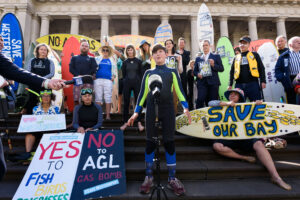In January 2024 the Federal Environment Minister Tanya Plibersek vetoed a wind terminal proposal at the Port of Hastings, citing “clearly unacceptable” risks to local flora and fauna. In our view, it was the right decision to make – and one that should be extended to stopping polluting fossil fuel projects.
All major projects need to be subject to rigorous environmental protection laws. This applies to polluting fossil fuel projects and renewable projects.
As Jane Carnegie from local group Save Westernport said, “The decision demonstrates the Federal Minister using her powers to protect highly significant ecosystems, like the Internationally recognised Ramsar Wetlands of WesternPort, from multiple threats… The dredging and construction required would have destroyed or degraded large parts of the wetlands.”
Our precious local ecosystems face threats on multiple fronts: inappropriate industrial development at the local scale, and the systems-level threat of more frequent and severe storms, heatwaves and fires, sea level rise and temperature changes posed by the continued burning of fossil fuels.
Right now we are in a critical phase in Victoria’s energy transition, and we need to get this right.
Given the reasons behind the veto decision, it seems unlikely that it will be possible to balance ecological protection with the needs of the offshore wind industry to use the Port of Hastings as the staging post for constructing the wind turbines.
The Victorian Government ought now to consider suitable alternative sites. Environmental groups including Environment Victoria will continue to apply consistently high expectations for nature protection to any new proposal, whether it’s for offshore wind or import gas terminals like the proposal from AGL we fought against (and won!) in 2021.

The Westernport community mounted a huge, years-long campaign to stop AGL building its polluting gas import terminal in the Bay. In 2018, the Planning Minister finally rejected it.